English Edition

- By CNI
- Category: English Section
- Hits: 627
CNI News
8 September 2023
Over 100 overseas employment agencies have increased more than the last two years because it has become good to do business as agencies and the number of people who go abroad for work has increased, those who help migrant workers said.
There were about 300 licensed overseas employment agencies in 2021 and the number of agencies has been up to over 400.
Although the ministry of labor grants a license if an agency meets the requirements when it applies for a license, as fraudulent issues may be rampant with more agencies, the ministry needs to strictly supervise them, said Ko Thar Gyi, one of the people helping migrant workers, to CNI News.
" An overseas employment agency can earn money easily and the relevant department is not free from corruption if there's anything wrong. Talking of more agencies, former police officials or people relating to them, and people relating to military officials found the agencies. They have more rights than an ordinary civilian. If an agency is closed and another agency is founded, the founder must be another person. But what is related, when the agency that is closed has to deposit, they pay for it. Even though the ministry know about it, the ministry grant the license due to consistence with the procedure. It's too bad that the agency that is closed cannot be taken action against." said Ko Thar Gyi.
Moreover, the agencies that were closed re-applied for licenses as new agencies changing the name of founder and have got licenses reportedly. Overseas employment agencies become more not because the number of people who go abroad has increased, said U Zaw Min Min, leader of the Malaysian Working Committee, to CNI News.
" Not everybody who applied got the license. Some agencies haven't got the licenses for about six months. You can't say the number of people who go abroad has increased. Recruitment of new labors from foreign countries has become less in Singapore, Malaysia and Thailand. According to the office of the Overseas Workers Identity Card, the number of people who officially go abroad relatively has so much decreased. Job opportunities in those countries are not good." said U Zaw Min Min.
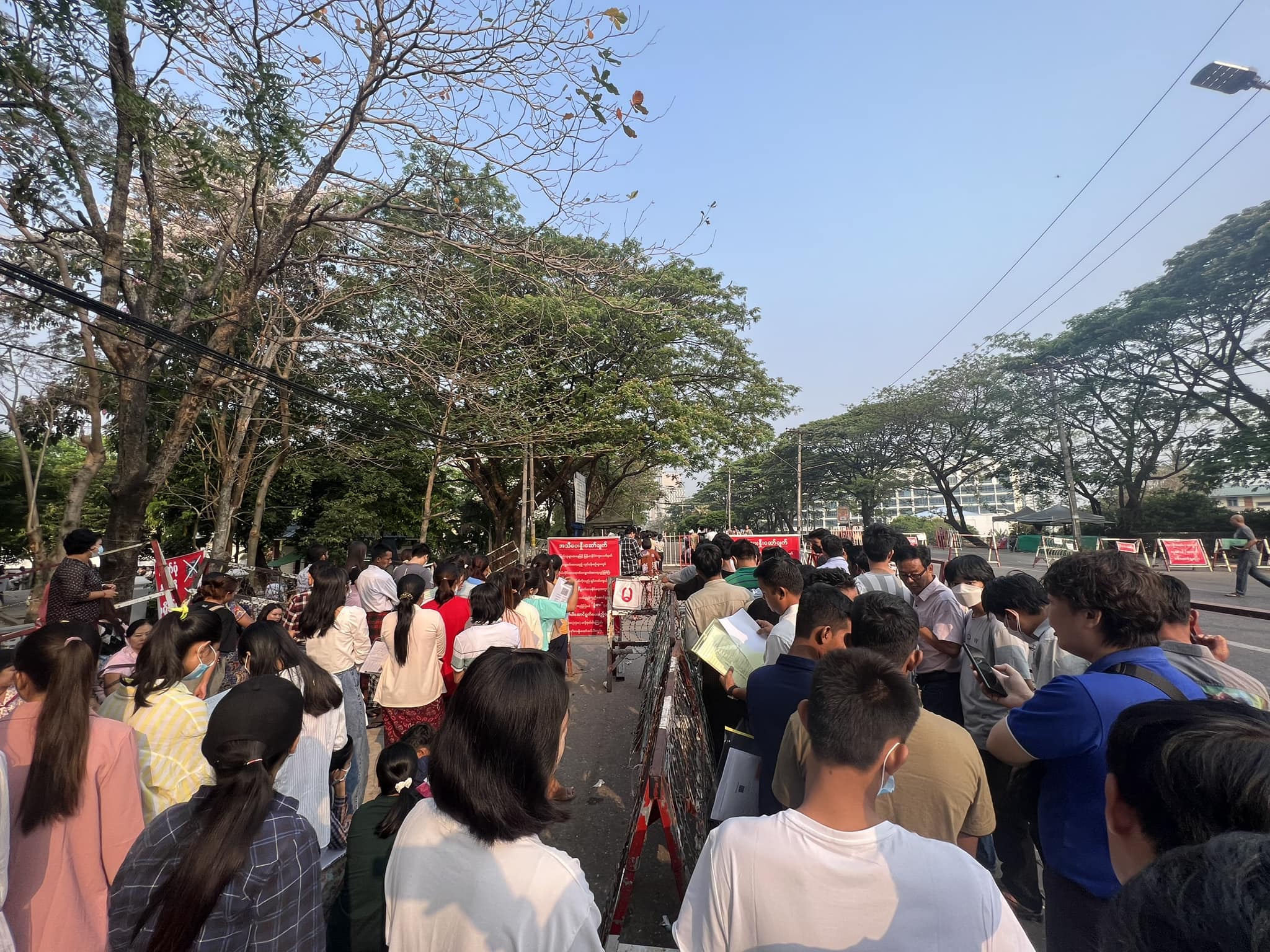
People who are waiting in line to get passports
In stead of granting licenses to agencies, the ministry should carry out emphatically for the sake of Myanmar migrant workers, said the people helping migrant workers.
" When the people are sent to another country, we should systematically solve the problems of the migrant workers without being a way of focusing on agencies. Apart from taking action against an agency, we should take into account of the emotional damages and lives of those who were victimized. We need to help them because this is a way of official selling the people. The agencies should have understood they are the workers who came taking risk of all their ownerships, having sold their farmlands or their houses." said Ko Naing Aung Aung, director of the Arakan Workers Organization.
In order to be able to prevent from nominal and dishonest agencies, the ministry is scrutinizing to enable the agencies that can really invest to apply, said Dr. Pwint San, former minister.
When the ministry scrutinize license application, an agency that has applied has to fully protect its workers who face problems in foreign countries, he said in the meeting held on 2nd August.

- By CNI
- Category: English Section
- Hits: 609
CNI News
8 September 2023
If traders and government servants work correctly, centralization system can be weakened, said businessmen and economists. As the current Myanmar economy has changed to centralization system from market economy, the people are facing with difficulties.
Moreover, because restrictions on import and export, and controlling domestic trade have arisen, the people are suffering from higher commodity prices with unsmooth flow of goods.
If traders were fraudulent and government staffs didn't work correctly, market economic system could be weak and centralization system could be strong, said U Thet Zaw, an economic analyst, to CNI News.
If we want the centralization system to weaken, traders need to work correctly and government servants need to carry out exactly." said U Thet Zaw.
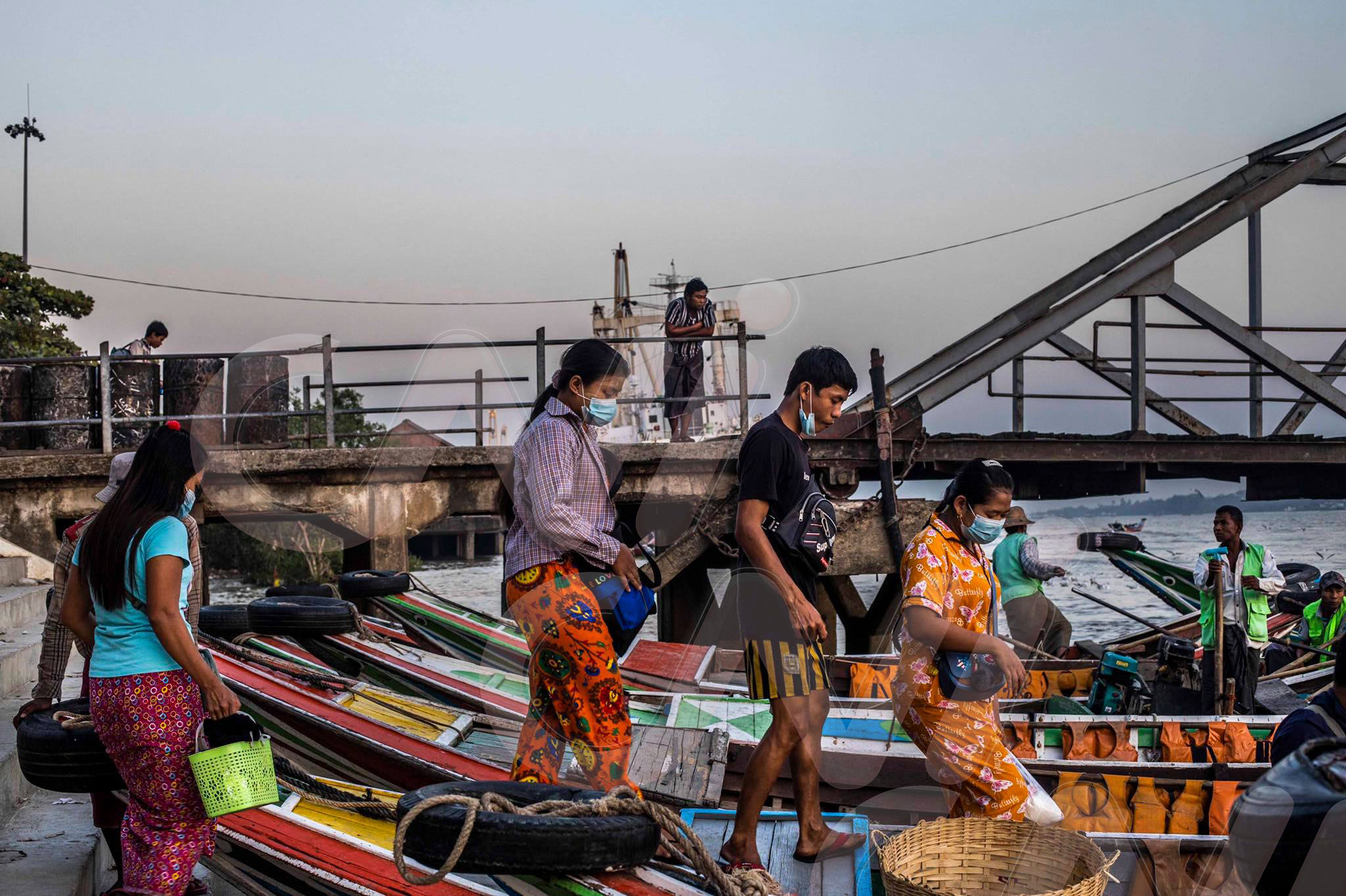
Vegetables
Supporters of the market economy don't like the government's intervention on price limitation and allocation of licenses reportedly. However, the current economy of Myanmar is the mixture of market economy and some government interventions. Government interference in local businesses can cause the economy to decline and the public to suffer from crisis, concluded the market advisors and businessmen.
" I don't like the red-tape system or centralization system in which you can go on working only if you inform a senior official. Because we don't like a system like this, we pushed to apply a democratic system. But, the problem is that middle officials don't dare do anything without the knowledge of higher-ups because they don't want to take the responsibility. So, things that shouldn't be delayed are being delayed. Some issues are related to each individual. If the official is traveling, you have to wait until he returns from his trip. The official don't tell to do without his knowledge. But if the government servants work with responsibility and accountability, it will be better." said U Aung Pyae Sone, a businessman.
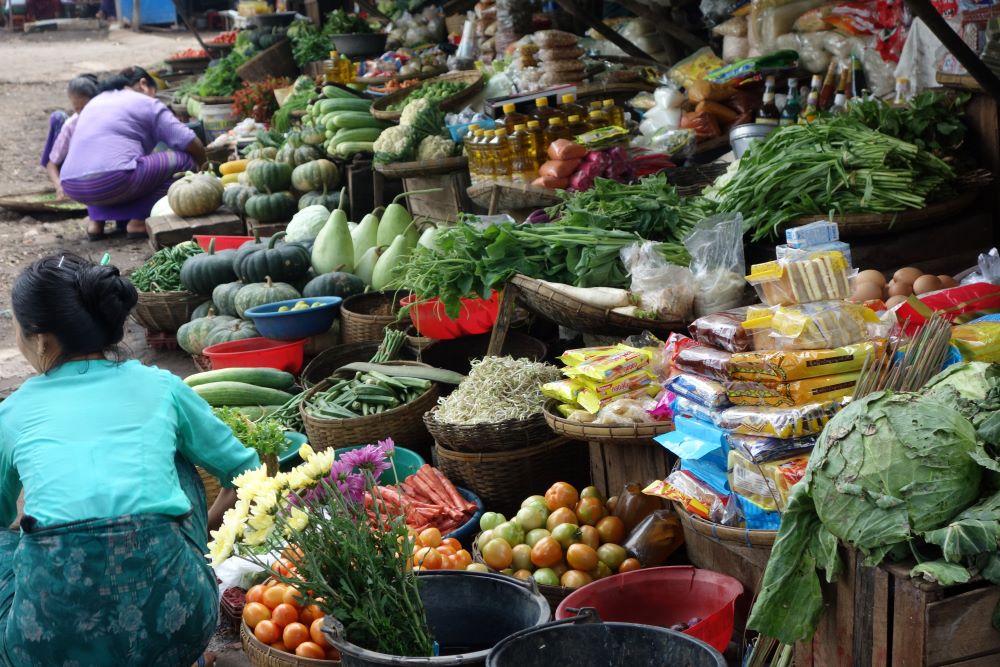
People from basic class
The centralization in economy must be reduced little by little, said Sr-Gen Min Aung Hlaing, chairman of the State Administration Council. According to the market demand, important commodities such as rice, edible oil and fuel should not controlled and the government should intervene some sectors that need stability, said businessmen.
Moreover, the government need to provide more support to the rice and oilseed sectors, they pointed out.
It is difficult to get permits for trading industries and export/import and it is also difficult to import goods from abroad. Moreover, illegal trade has been closed as well, said traders and businessmen.

- By CNI
- Category: English Section
- Hits: 642
CNI News
8 September 2023
Ability to produce weapons and ammunitions by themselves in order to meet the needs of the war was a turning point of the revolution, said Duwa Lashi La, acting president of the National Unity Government.
He said that in his speech in commemoration of the 2nd anniversary day of the Declaration of People's Revolutionary War that falls on 7th September, 2023.
" We have been able to carry out systematically in the sectors such as administration, judiciary and public service in the areas we have dominated. Moreover, that we have been able to produce weapons and ammunitions by ourselves to meet the needs of the war is a turning point. We can know that we are getting more and more military successes by looking at the results of the recent battles. Our revolutionary comrades have been able to perform to make the enemies feel insecure even in Naypyidaw which is believed to be the safest place for the enemy military group." said Duwa Lashi La.
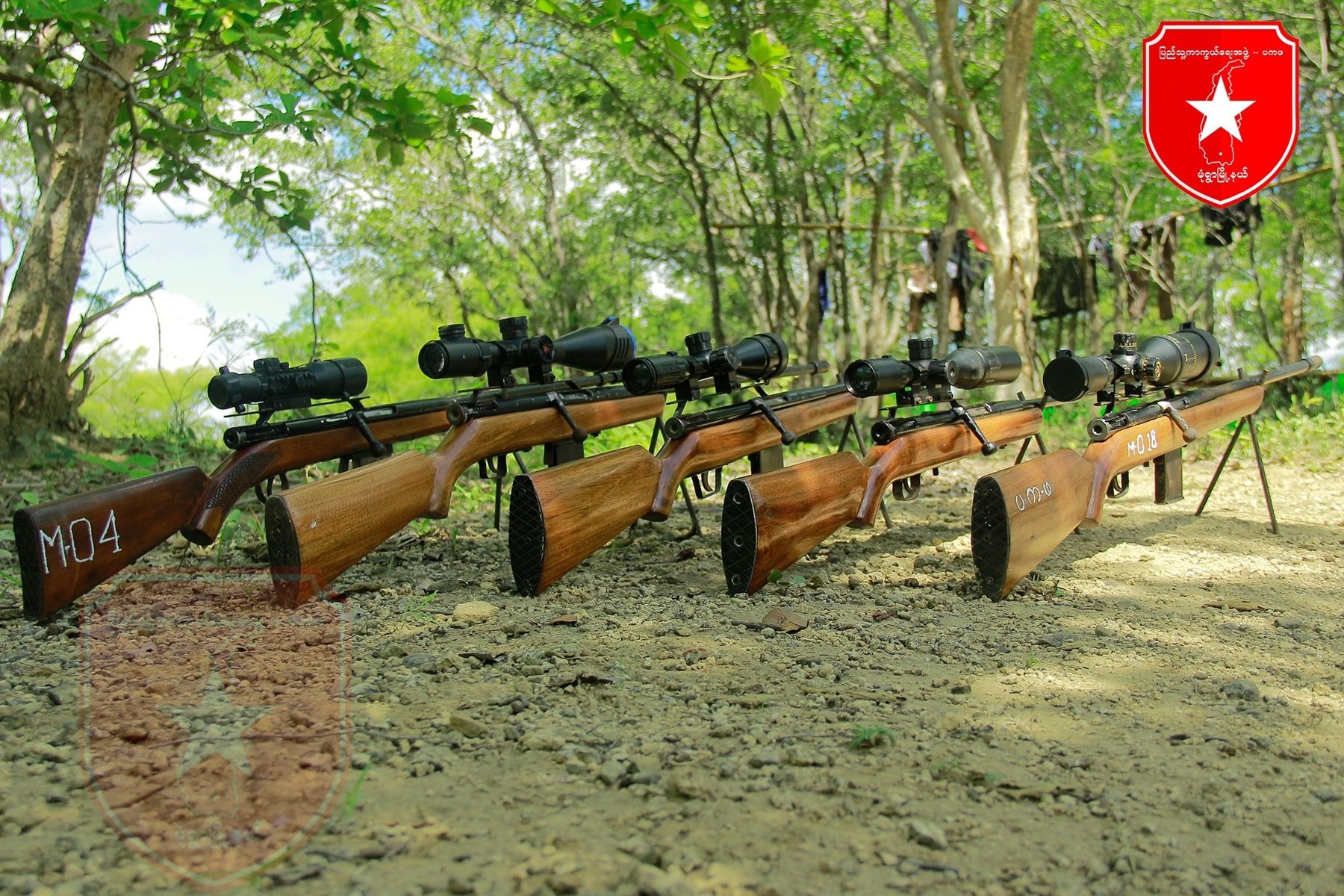
Weapons that PDFs use
Production of weapons and ammunition was not strange these days, but it was impossible to produce high-quality weapons and ammunitions. Moreover, according the nature of war, no place was safe, said Dr.Aung Myo, a Myanmar politics analyst, to CNI News.
" In the nature of war, anywhere is not safe. He said that because he has never been a soldier. If a man had been a soldier or has been an anti-NUG politician, he is not safe. Since the time when there was a large white area in the interior of our country, as soon as I put on the uniform and I picked up the gun to go to the front line, I felt insecure. So, what he said is not wrong. No place is safe. To tell you frankly, even New York in US is not safe." said Dr. Aung Myo.
The NUG has won the military successes during the past two years and the State Administration Council has failed in military, politics and diplomatic affairs, said Duwa Lashi La.

Bangladeshi ambassador is handing over his appointment letter to Sr-Gen Min Aung Hlaing on 6th September, 2023
On the other hand, ambassadors from Bangladesh, Thailand, Nepal, China, India, Saudi Arabia, Iran, Japan, Cambodia, Lao, Vietnam and other countries have been presenting their letters of appointment as ambassadors to Myanmar to Sr-Gen Min Aung Hlaing, chairman of the SAC. Moreover, representatives from UN and international organizations have been meeting with Sr-Gen Min Aung Hlaing.
Democratic elements have been waging armed revolutions against the Tatmadaw since after 1st February, 2021. And then, armed conflicts began to break out throughout the country and battles between the two sides have been breaking out severely up to now.

- By CNI
- Category: English Section
- Hits: 815
CNI News
7 September 2023
As the illegal agencies in Malaysia are fraudulently selling fake job offers, new overseas employment agencies in Myanmar need to be extra careful, said the Myanmar Overseas Employment Agencies Federation (MOEAF), to CNI News.
Because a demand letter presented by licensed agencies contained so many people that applied the KSM approval, when an official from Malaysia was asked to investigate it, it was found to be fake.
Illegal agencies or brokers are fraudulently selling fake demand letters to the agencies in Myanmar, Indonesia and Bangladesh after creating fake quotas, said in a statement released by the Safe Migration. Licensed agencies that get scammed are new agencies, said U Zaw Min Min, leader of the Malaysian Business Committee, to CNI News.
" They are cheated in person-to-person connection. There are legal agencies in our side and there are also legal agencies in their side. I haven't seen anybody who contacted their legal agencies' permanent addresses, e-mails and telephones was cheated.
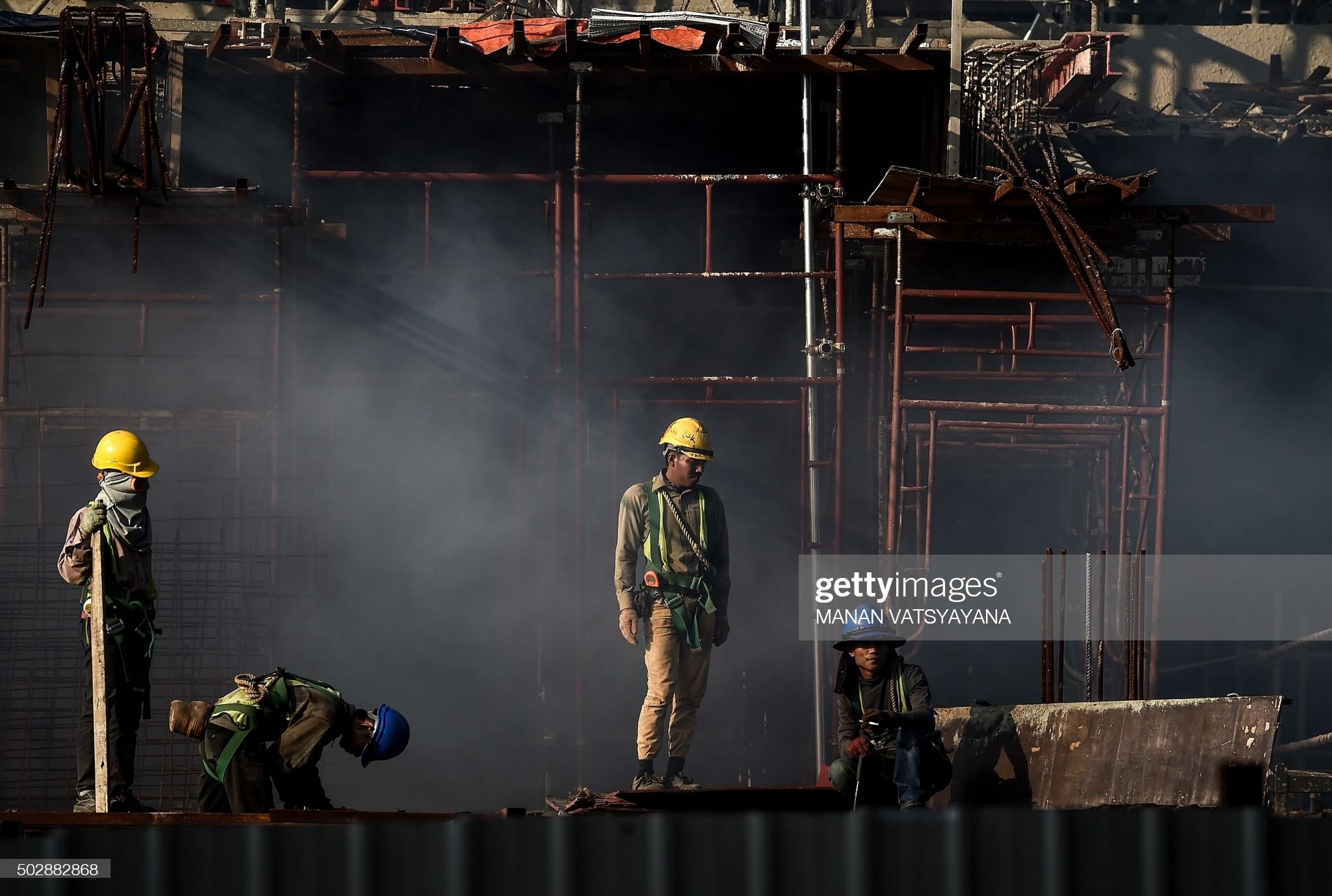
A construction site in Malaysia
Mainly, it's the negligence of those who have been employed to look for demand letters. They have licensed C holders who have rights to call workers from foreign countries. You should contact with them or employers directly. These two are safe. You can check on the immigration website. KDM and KSM are faked by computer generated paper and shown. Otherwise, signed document is shown with a photoshop software. It's sort of an easy cheat." said U Zaw Min Min.
Among those who were cheated, first licensed agencies according to the law enacted in 1999 and agencies that are ten years and above old were not included. Newly licensed agencies only were cheated due to a lack of understanding of the nature of the business, added U Zaw Min Min.
If an agency received a demand letter, it should contact to the employer directly, which is advised. Because there are liars not only in Myanmar but also abroad, depending on the labor market, agencies need to carry out carefully, warned the Safe Migration.

MOEAF signboard
As Myanmar licensed agencies that were cheated don't give back service charges to the workers, if complained, the license will be suspended and the agency' money deposited will be lost, said Safe Migration.
" To the best of my knowledge, many agencies were cheated. Most of the agencies that were cheated largely don't give back service charges to the workers without taking care of being blacklisted because they are new agencies that have no backing." said Hmwar Michael, one of the people helping Myanmar migrant workers in Malaysia.
Currently, as the economy in Malaysia is declining, recruitment of workers not only from Myanmar but also from other countries is low, according to the MOEAF.

- By cni
- Category: English Section
- Hits: 558
CNI News
7 September 2023
In the border trade with Bangladesh, water products are allowed to export to Bangladesh through the Sittwe border trade camp only, which makes the traders in Maungdaw difficult reportedly.
Aiming to carry out trade activities in an orderly manner and to develop trade, in the border trade with Bangladesh, water products and agricultural products are only allowed to be exported through the Sittwe Trade Station, said in a statement released by the trade department.
A variety of freshwater and saltwater fish, and agricultural products - rice, broken rice, various kinds of pea and bean, sesame, peanut and onion have been allowed to export at the Sittwe Trade Station only starting from 4th September, 2023, said in the statement.
The traders who are mainly exporting freshwater carp, and workers in Maungdaw have found it difficult because the traders are not allowed to export water products including freshwater carp to Bangladesh through Maungdaw reportedly.
When the products are exported through Sittwe, because it takes long, the quality of water products declines and the price also declines, said U Thein Maung, a trader from Maungdaw in Rakhine State, to CNI News.
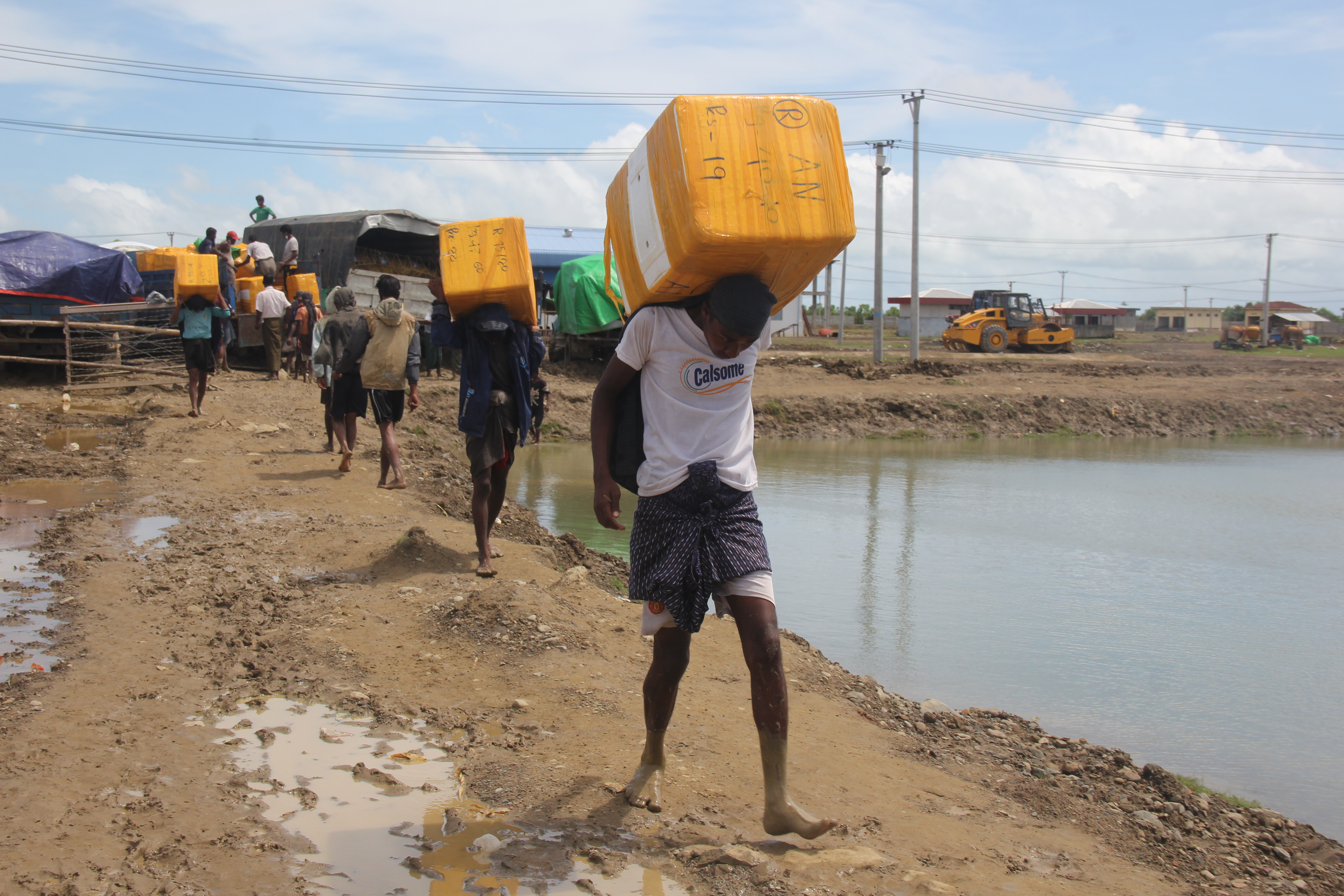
Commodities are being carried at the Rakhine-Bangladesh border trade
" The department doesn't issue new license anymore for the products that are included in the statement starting from 4th September. The rest products are being exported. The products mentioned in the statement will be exported through Sittwe but not through Maungdaw. Especially water products were being mainly exported through Maungdaw. Now that these products are not allowed to export through Maungdaw, the workers and others all have been in crisis. Fish is a kind of perishable products and it takes 45 minutes or one hour if you go to Bangladesh from Maungdaw by boat, but from Sittwe, it may take about 24 hours. Because it takes too long, the water products' quality declines. And then, the prices also fall down. To be the best is to export water products through Maungdaw rather than other products. If you go from Sittwe, you can't sell at a higher price." said U Thein Maung.
Export of goods to Bangladesh through Sittwe is almost non-existent reportedly. Because export of goods throufg Sittwe is taking too time, quality declining, costlier and prices declining, traders are exporting their goods through Taungup and Maungdaw reportedly. If water products were exported through Sittwe, the trader may make a loss without making a profit, said the traders from Maungdaw.
So, the statement probably released to export water products and agricultural products through Sittwe in order to increase freight in Sittwe and the traders in Maungdaw have presented to the relevant authorities to allow them to export water products through Maungdaw, said U San Aung, a trader from Maungdaw, to CNI News.
" Sittwe is the capital of Rakhine State, but of the ports in the state, at its port, flow of goods became almost non-existent. Agricultural products such as ginger are exported through Taungup.If the goods are exported through Taungup, truck fare is low. Export of goods was conducted a lot through Maungdaw. The flow of goods became non-exsitent at Sittwe. The traders in Sittwe might be able to present to State Government or relevant senior official about it. The traders in Maungdaw are discussing. Because they are freshwater and saltwater fish exporters, they talked about it with the fisheries department so as to be able export water products through Maungdaw. They are planning to present in black and white. We have asked the fisheries department for help." said U San Aung.
At present, the rest of the goods previously permitted are being exported at Maungdaw border trade camp reportedly.

- By cni
- Category: English Section
- Hits: 654
CNI News
7 September 2023
As the Union Election Commission (UEC) is making preparations to make the voters vote by the electronic voting machine, there are questions among the political parties whether he electronic voting machine is free from error or not.
UEC met with some political parties and introduced the electronic voting machine and Experimental voting was conducted.
Because the voting machine is not connected to internet, it will not be hacked. And it is convenient because it works with batteries if the electricity is out of order or at the places where the electricity is not available, said U Thet Zaw who attended the discussion, to CNI News.
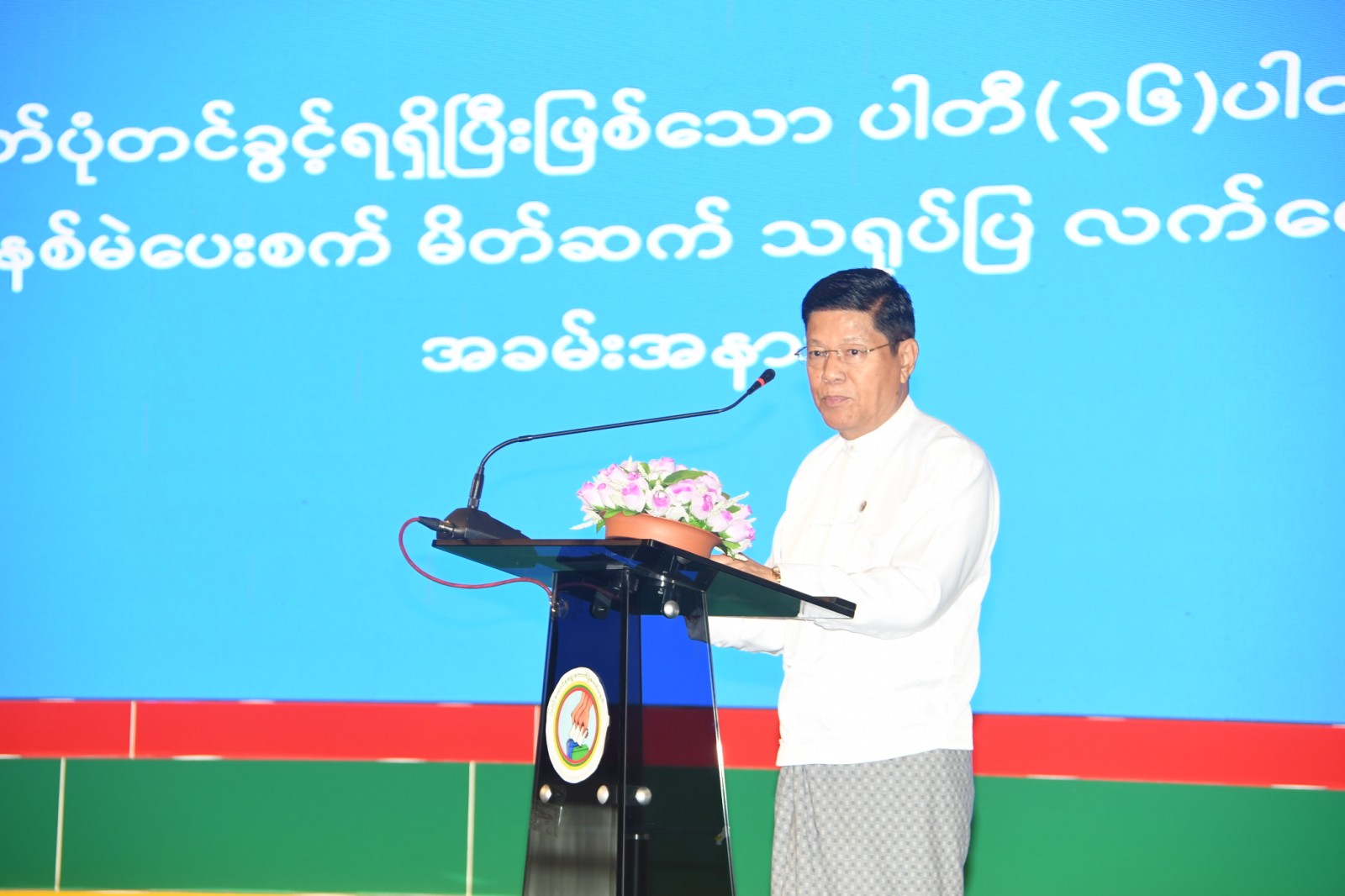
U Thein Soe, chairman of the UEC
" The electronic voting machine was produced by local experts. They have said that they have experimented it by tens of thousands times. But, to tell you frankly, there are still questions about responsibility and accountability. It can works with battery if the electricity is not available. That's not bad. It can be used not only in urban area but also in rural area." said U Thet Zaw.
Voting machines are low cost and can be widely used throughout the country, and voting results can be counted at once, said U Thet Zaw.
As the answer comes out immediately with just one click of the voting machine button, voting is easy and it is easier rather than printing by stamp used in previous elections, said Mahn Aung Pyi Soe, chairman of the Karen National Democratic Party, to CNI News.
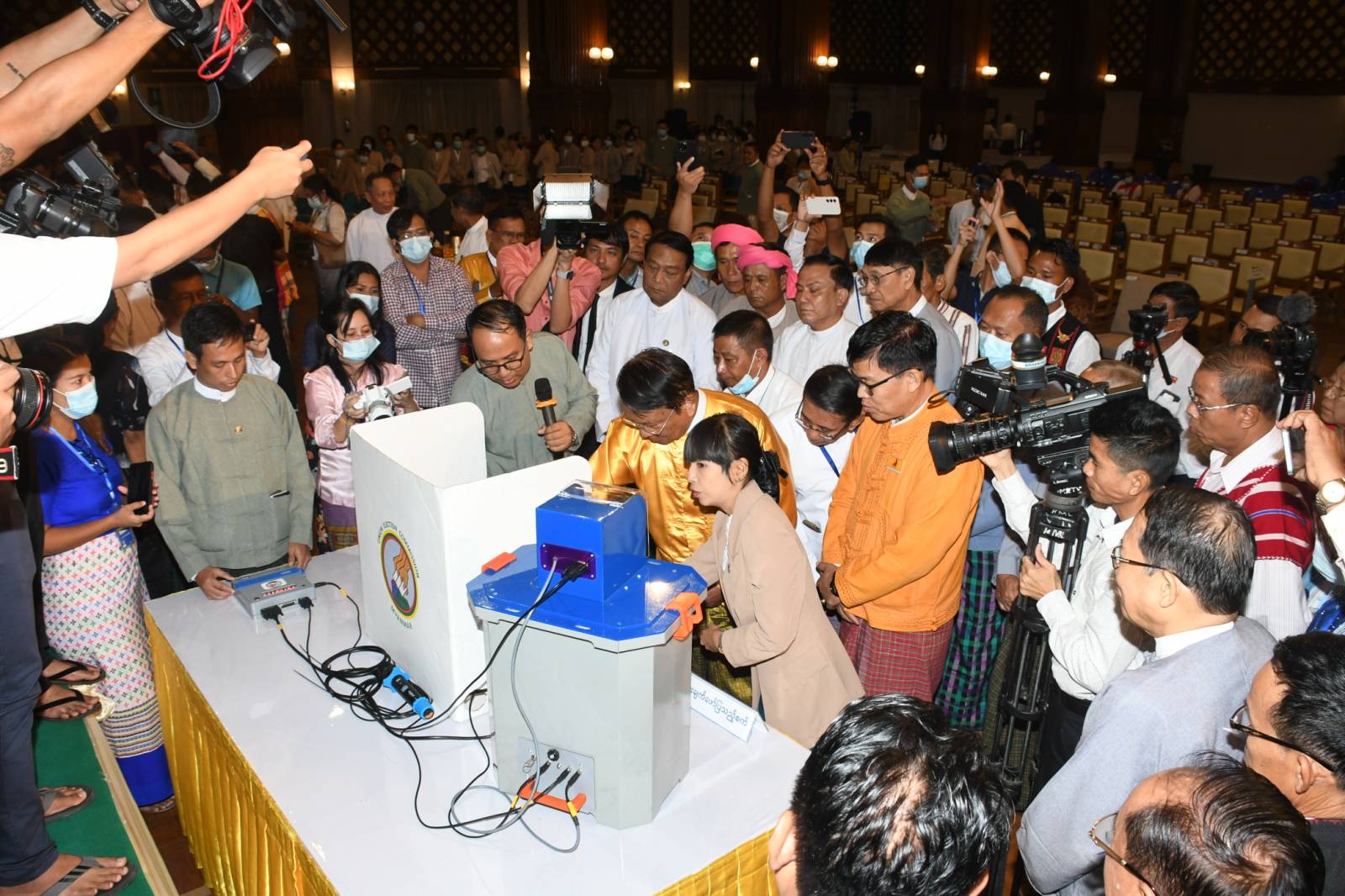
The UEC is explaining to political parties about the voting machine that will be used in the election
" They said that it is produced by MicroMyanmar. If the result produced by the machine contains no lies or technologically created tricks, we can say that it is fair. A voter cannot press the button two times. What you press first is your vote from which a party's logo will come out. You have no rights to press second time." said Mahn Aung Pyi Soe.
The meeting with the UEC on 5th September, 2023 was attended by the leaders from 36 political parties. The UEC showed its preparations relating to voting systems that will be used in the coming general election.
The State Administration Council has said that it will hold a general election after taking the census throughout the country in 2024.

- By CNI
- Category: English Section
- Hits: 1308
CNI News
6 September 2023
When Myanmar nationals in Thailand ,come to the Myanmar Embassy to make passports in person without having to make appointments, the embassy needs to release the number of people to be daily accepted, those who are helping in the affairs of migrant workers told CNI News.
Although being able to apply for passports in person without having to make appointments is good for Myanmar migrant workers, there are still advantages and disadvantages, pointed out the people helping migrant workers.
" You can apply for the passport without making appointment, that is very good. But here we have to ask the department which has released that making appointment isn't needed anymore. Is it able to serve all the applicants daily? Is it able to issue slips to the applicants to come back and take the passport books in two weeks or 15 days. We have to watch it. There are several million people who have held Myanmar passports in Thailand. And there are over 600,000 Myanmar nationals whose visas will expire in November. When the people can apply for passports in person, why doesn't the embassy designate the number of people? Myanmar Embassy to Thailand should release an announcement how many passport books will be issued each day. Is it the cost in accordance with the amount designated by the existing law? They should be announced." said Ko Thar Gyi, one of the people helping the migrant workers.
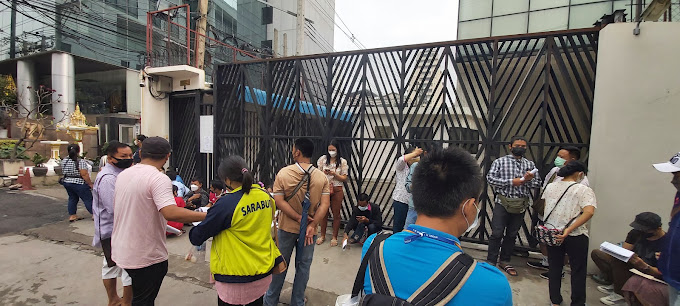
In front of the Myanmar Embassy
Because the number of appointees went very few recently in the Myanmar Embassy in Bangkok, the embassy has suspended making appointment starting from 2nd September, 2023.
So, those who want to apply for new passports for job and Myanmar nationals whose passports will expire on the end of June 2024 can come and make passports in person without taking appointments, released the Myanmar Embassy in Bangkok.
Being able to apply for passports in person without taking appointments may be a bit difficult for Myanmar migrant workers who are working at the places that are distant from Bangkok, said U Aung Kyaw, an official from the Labor Rights Foundation, to CNI News.
" Now that those who want to apply for passports can come and perform in person without taking appointments, Myanmar migrant workers who are working at the places that are distant from Bangkok .may find it a little difficult to travel. But they don't have to wait for 6 to 9 months. In the past, the workers applied through brokers. It is a situation in which the workers don't have to pay extra money. Brokers' involvement may decline, I think. But the role of brokers will not die out at all. Several million Myanmar migrant workers in Thailand will involve with brokers, I think." said U Aung Kyaw.
Migrant workers who have registered in the name list have been allowed to stay and work until the end of September in Thailand and Myanmar authorities are performing to enable Myanmar MoU workers to renew their passports in Myawady and Kawthaung with one stop service.

- By CNI
- Category: English Section
- Hits: 804
CNI News
6 September 2023
Although Bangladesh has offered to buy Myanmar sugar because it wants to meet its domestic demand, Myanmar can export the sugar to Bangladesh only next year, according to the Myanmar Sugar & Cane Related Products Association.
If the sugar is exported to Bangladesh next year, only excess amount than the domestic consumption can be exported, said U Win Htay, vice chairman of the Myanmar Sugar and Cane Related Products Association, to CNI News.
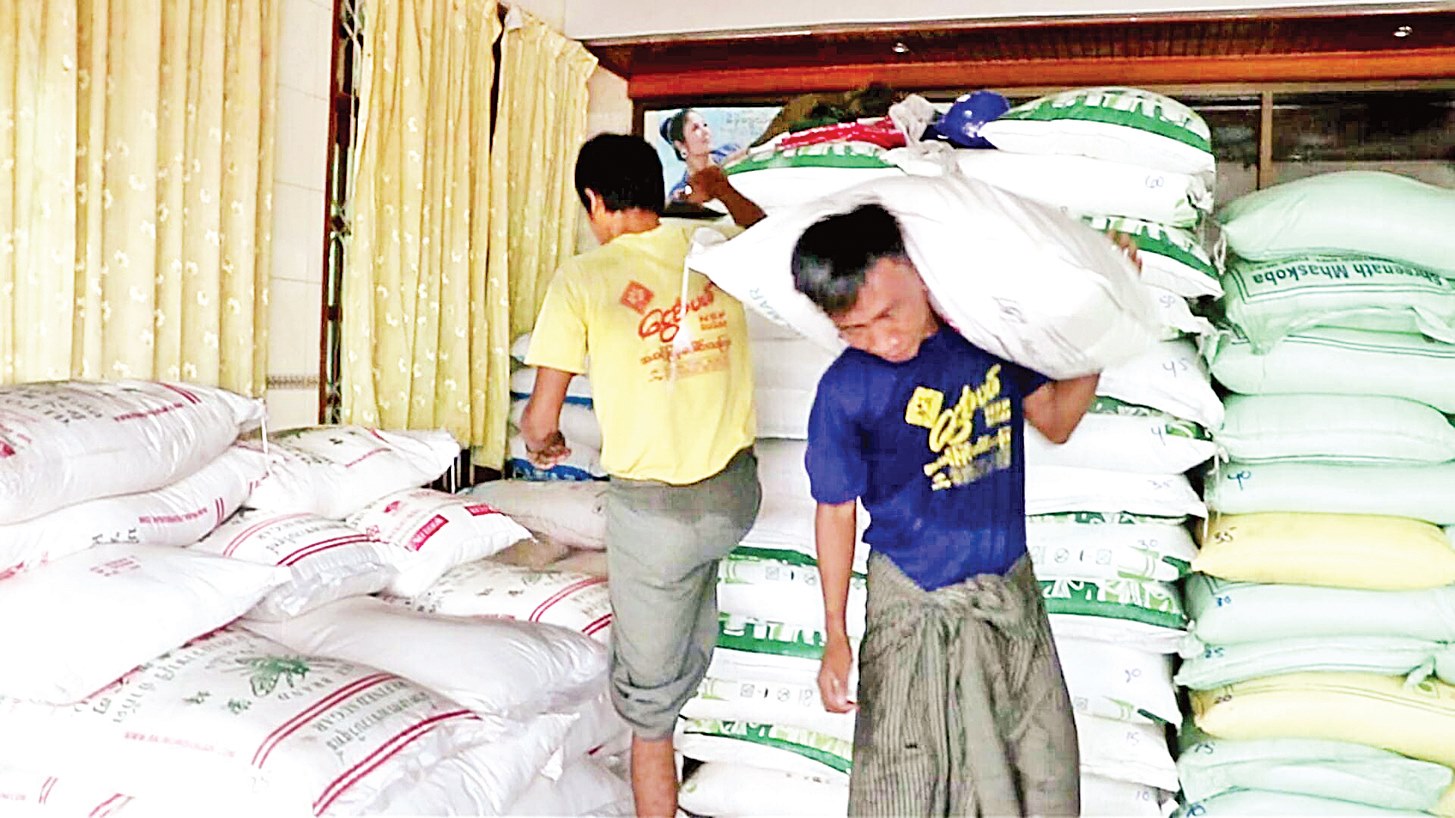
Bags of sugar are being carried
" Although Bangladesh has offered to buy sugar from Myanmar, Myanmar can sell only next year. Because Vietnam also wants to buy Myanmar sugar, they are sending letters here. But the Myanmar side can't sell. We need to have enough sugar for the domestic consumption as well. And the sugar price is a bit high.
Another thing , next year, sugar mills will also increase. We can increase selling a lot in the market. But we can export the sugar only when we have extra than the domestic consumption. We still don't know the amount they will buy." said U Win Htay.
It would be less likely to be able to sell if foreign countries wanted to buy 20,000 tons of sugar each month, he added.
" For example, Vietnam wants to buy 10,000 tons a month and so does another country. If 20,000 tons are wanted from abroad, we don't have that amount to sell. But the production will increase. And domestic consumption will also increase. We have take to that into account." said U Win Htay.
After meeting the domestic demand, excess sugar is exported to Vietnam and the Philippines.
Domestic sugar consumption is about 350,000 tons, and over 70,000 tons is being exported, said the Myanmar Sugar and Cane Related Products Association.
This year, the sugar price is 110,000 kyats per ton. So, peasants will grow more sugar cane and if the sugar is exported more than before, peasants will be able to sell sugar cane at a higher price, said U Maung Swe, a sugar cane peasant, to CNI News.
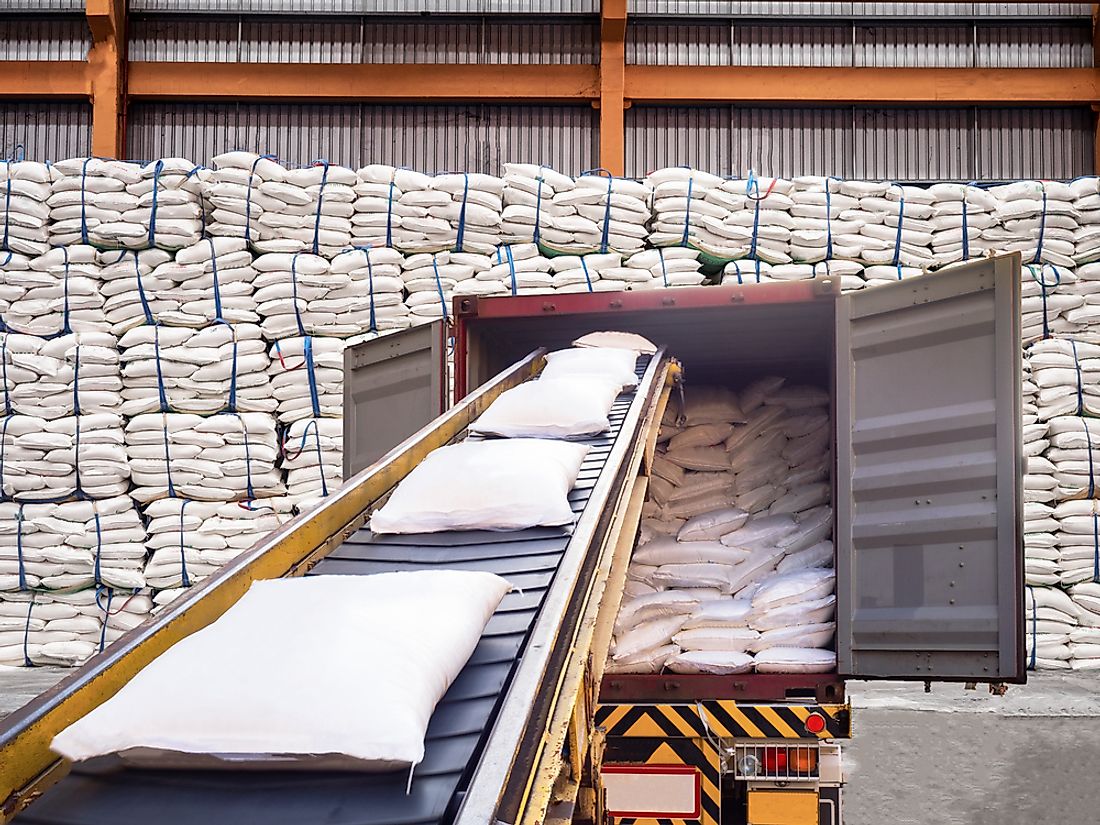
While storing sugar bags.
" This year, peasants grow more sugar cane. Sugar mills also provide loans. The yield this year increases than last year. The price of sugar cane is 110,000 kyats per ton, so peasant will grow on more acres in the coming year. The yield will increase by 30 to 40 percent. If the yield really increase, the sugar must be exported. All the sugar produced in Myanmar cannot consumed domestically. If the sugar is exported, its price will be higher. If the price is higher, sugar mills buy sugar cane from peasants at a higher price. So, it is more convenient for peasants." said U Maung Swe.
Because Bangladesh wanted to buy Myanmar sugar, there was a discussion between Bangladesh and the Myanmar Sugar and Cane Related Products Association in August reportedly.
The sugar exporting period has come to an end. Sugar cane cultivation will probably increase in the coming year and production of sugar will probably increase.
So, Myanmar sugar will probably be exported more, according to the Myanmar Sugar and Cane Related Products Association.

- By CNI
- Category: English Section
- Hits: 903
CNI News
September 5, 2023
The Arakan Liberation Party reunification is underway, Col.Khaing Kyaw Hlaing from the ALP told CNI News.
However, they have not been able to implement the reunification at present, he said.
" We were able to get to a dialogue path with Bamar government with whom we were fighting against ceaselessly. We can have a dialogue among organizations separated from one party, I assume. We are trying to unite in one party every day." said Col. Khaing Kyaw Hlaing.
The group led by Khaing Ye Khaing, chairman, and Daw Saw Mya Raza Lin released a statement in January 2022 that the group led by Khaing Soe Naing Aung, vice chairman, had been expelled from the party because that group was trying to found a new party.
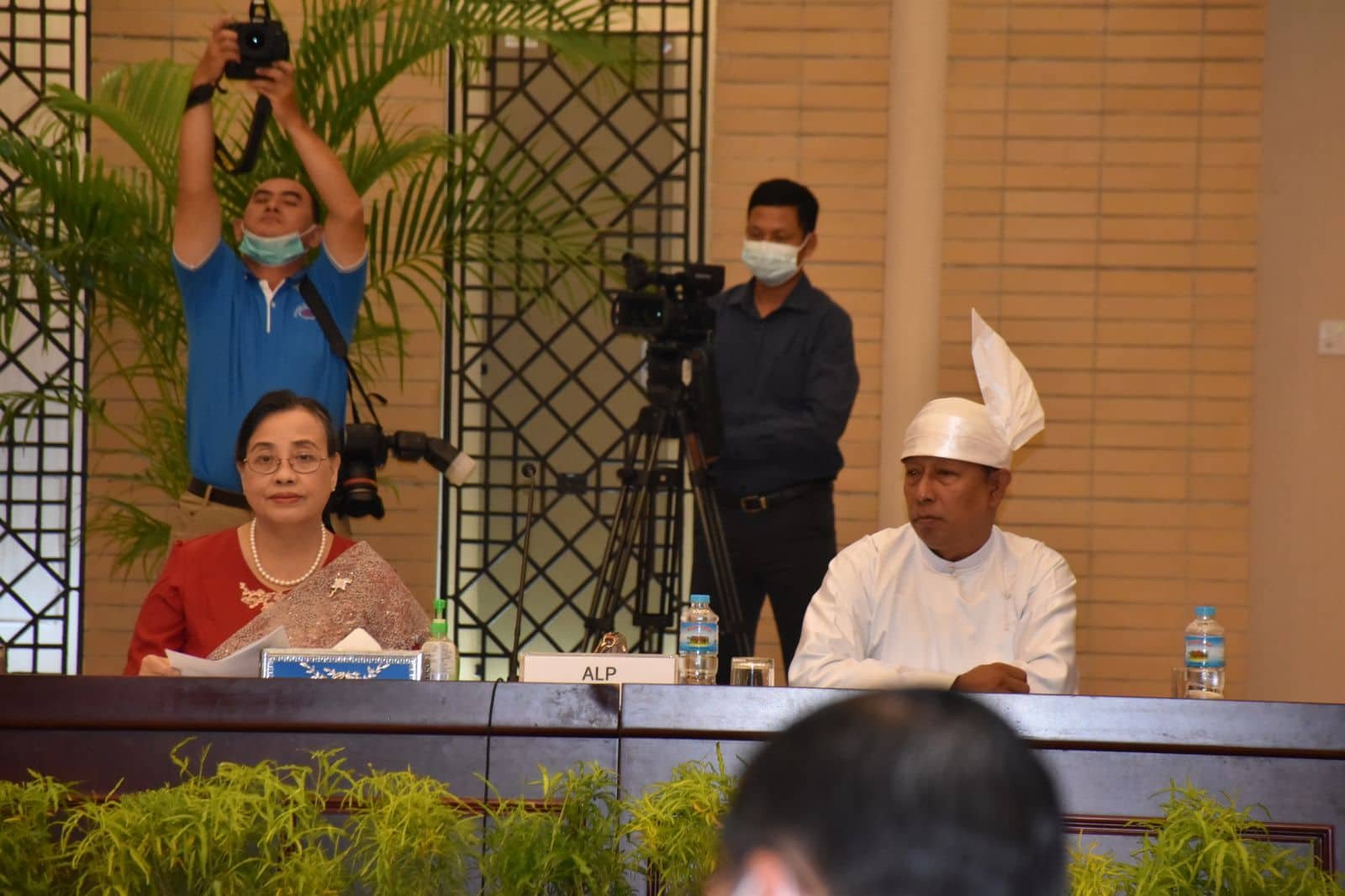
Daw Saw Mya Raza Lin and her force
Again, the path that the group led by Khaing Ye Khaing wanted to go was different from the one that the group led by Daw Saw Mya Raza Lin wanted to go, that they said after which the party were split into two in March 2023.
At present, the party was split into three and they are the group led by Khaing Soe Naing Aung, the group led by Khaing Ye Khaing and the group led by Daw Saw Mya Raza Lin.
" We often get in touch with one another. Yesterday, I talked about the paty with Khaing Min Soe, commander in chief from the group led by Khaing Ye Khaing. In the same way, I talk with Daw Saw Mya Raza Lin occasionally. We can't go on like this." said Col. Khaing Kyaw Hlaing to CNI News.

U Khaing Ye Khaing and his force
Col. Khaing Kyaw Hlaing is from the group led by U Khaing Soe Aung.
When CNI asked Daw Saw Mya Raza Lin about the ALP that is split into three groups, she told CNI that she had no comment.
The ALP has signed the Nationwide Ceasefire Agreement (NCA) on 15th October, 2015 together with seven other ethnic armed organization and currently, the ALP is having peace talks with the State Administration Council.



